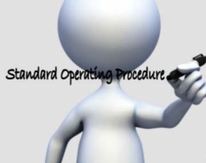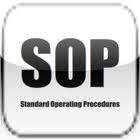| Continuing down the road to developing a management system for your family farm business, with the goal of increasing the odds of a successful transition to the next generation that enables your business to overcome the competing demands for capital in the form of internal growth and your financial security needs (i.e. retirement plans), let’s look at another area of increased formalization that is required as your family business becomes more complex – Standard Operating Procedures (SOPs). |
Sounds a Lot Like Policies
Recall, policies provide general guidelines by which day-to-day operational decisions are made, whereas Standard Operating Procedures (SOPs) are more specific and concentrate on the methods or approaches for performing specific tasks. Think of it as an Operations Manual which answers the questions of “how” do things get done around here?
Why is this important?
Standard Operating Procedures offer numerous benefits:
- Serves as a written, documented training tool for new and existing team members
- Enables clear, consistent and specific communication to a large team
- Increases the chances that team members will consistently perform tasks and activities using management’s preferred method
- Minimizes supervision and ad-hoc decision-making by team members on how to perform various activities (i.e. delegation)
- Provides a foundation for measuring job performance
- Increased or consistent productivity
- Creates structure which instill confidence in the leadership and credibility of the company which in turn serves as a recruiting tool for additional team members
- Helps lessen legal and liability issues in the event of accidents
- Increase the value of your family business
McDona;d's has developed very specific ways in which they prepare meals…if you can call them that! Ha. Seriously though, the time they spent developing their procedures can be leveraged over millions of employees and it results in VERY consistent job performance. After all, a burger made in Boston is the same as one made in Nashville and one made in Tokyo. The procedures determine the outcome, not the person doing it. Think about that for a moment in your business. What if you could duplicate your efforts? You can!
| While McDonald’s is an extreme example, standardized procedures will help a family farm business owner to try and get all of the knowledge out of their head, onto some paper (or computer screen), so someone else can duplicate the tasks that may currently only be performed by the owner. |
Unfortunately, developing a management system to make an easier generational transfer of your family business is hard work, not measurable from a dollars and cents standpoint and sometimes seems like a bunch of gobbly-gook. Since generational transition may be on your horizon, the need to work “on” the business often supersedes the need to work “in” the business. There is no right or wrong answer, it just depends on how you want the future to look. These standard operating procedures are certainly a large part of many successful family businesses’ management systems.
So,They're Important?
How?
A SOP should be written for ease and efficiency in use and needs to be specific to your business. It may be good to start with a boiler-plate template, or borrow some ideas from elsewhere, but this should be specific for your family business. Just as there are no cookie-cutter succession plans, there are no cookie-cutter Standard Operating Procedures or Operations Manuals. It starts with all the decisions and activities that take place in your business and documenting how they’re done.
How Much Detail?
A good guide for your family farm business might be to document procedures with enough detail so that someone with a basic understanding of your business can successfully reproduce the activity or procedure when unsupervised.
Who?
Procedures should be written by team members that are knowledgeable with the activity and your family farm’s internal structure. Often times, in smaller family businesses, this falls on the owners or senior management. After all, sometimes after 30 years in business, they kind of become experts, no? Now let’s get that stuff out of their heads and onto some paper so we can replicate their knowledge to help ensure some higher probability continued success without mom or dad having to be relied upon for daily decision making and operations.
A few weeks back we discussed job descriptions, roles and responsibilities…and hopefully you have spent some time in these areas. If so, these might also be the perfect people to physically write your family business procedures. Otherwise, a team approach can also be used to develop these SOP’s, assuming a number of people are involved.
One last note, as with all things in a management system – these are not written in stone. These are flexible. Things change. Feedback happens. Better ways of doing things are discovered. So, once again, this isn’t a "one and done" proposition. Time should be scheduled throughout the year, whatever works best for you, depending on your business, to revisit and change and modify your standard operating procedures or operations manual. This is a great way to get feedback and buy-in from team members. In time, they know what works, what doesn’t, how to do things better. What a concept – asking team members for their input on how to improve things. Not everyone does that.
Next week, helping identify and personalizing SOPs for your family farm business, outcomes of not having SOPs and helping the senior generation stop micro-managing.



 RSS Feed
RSS Feed
